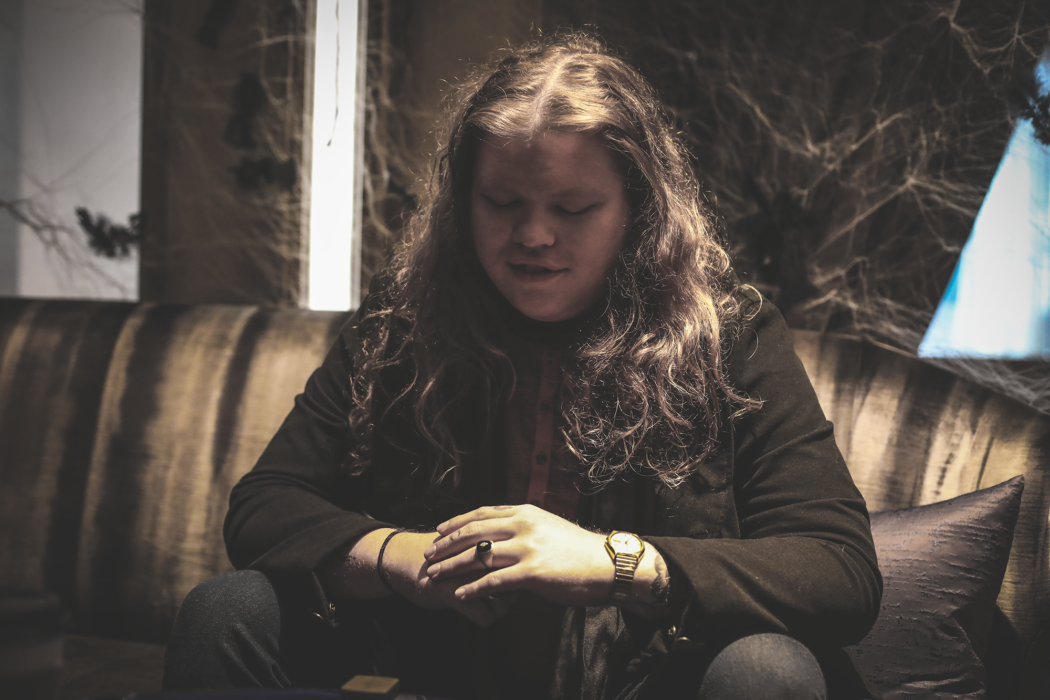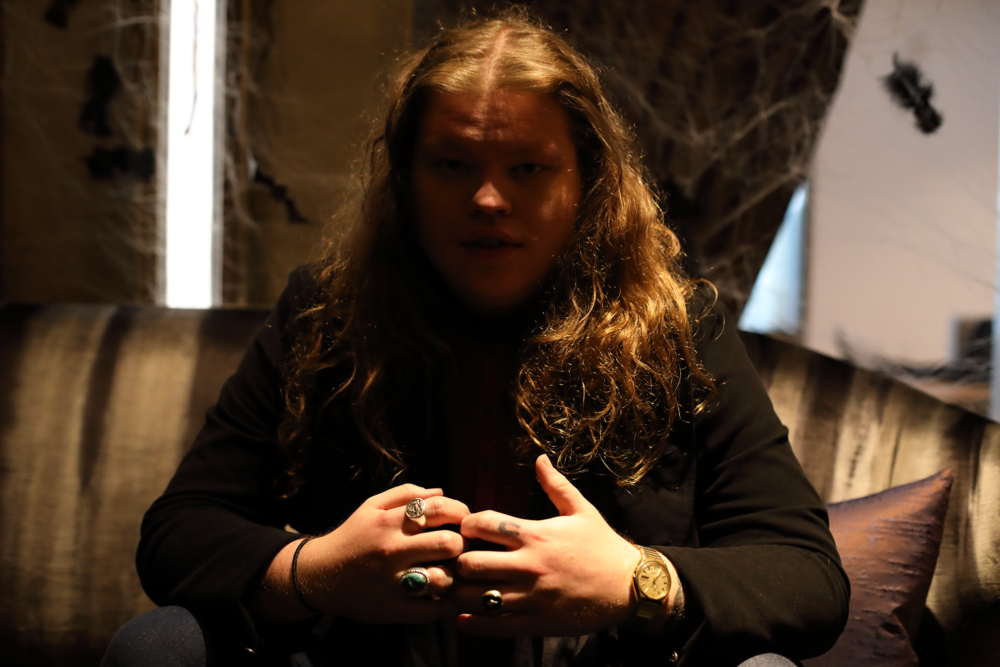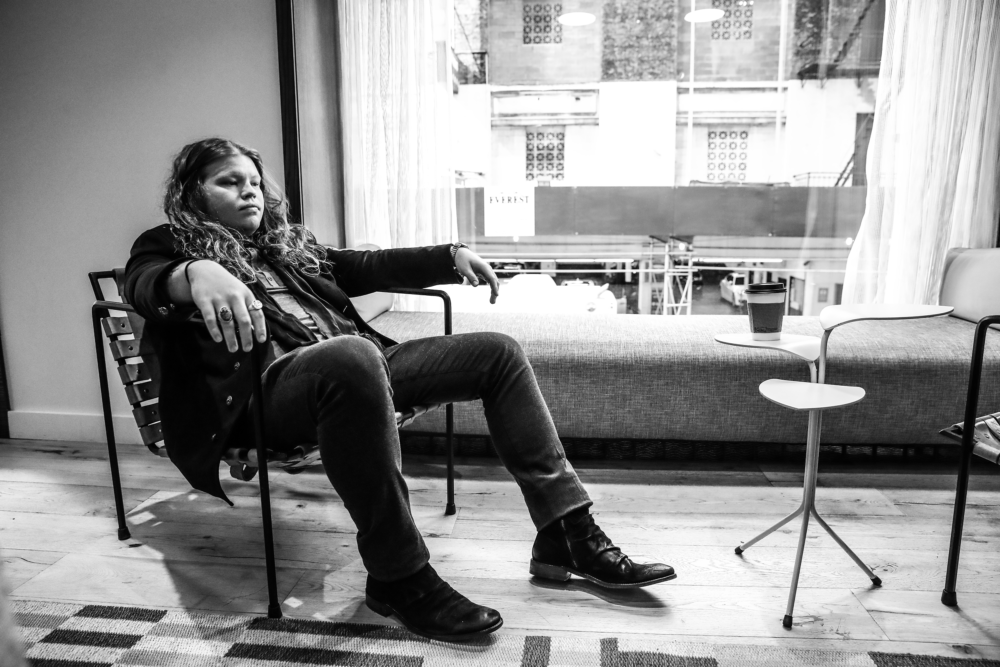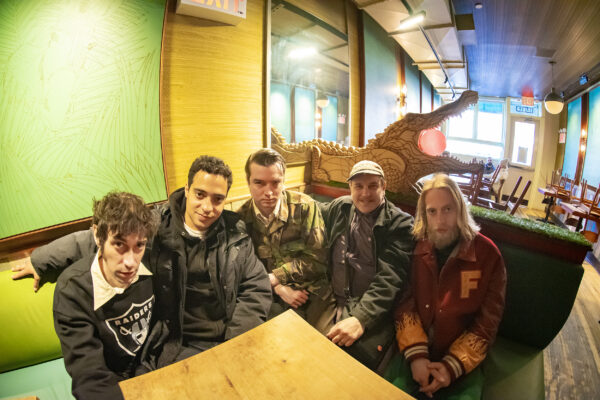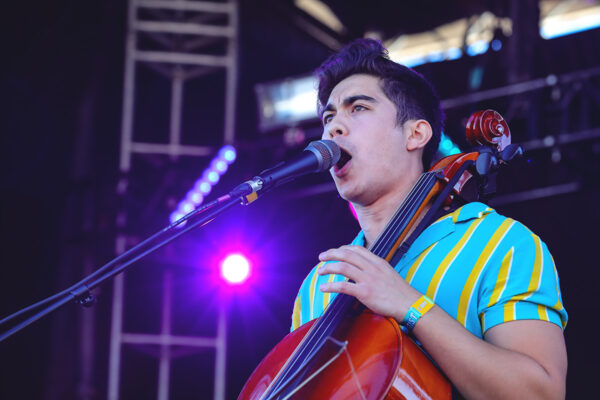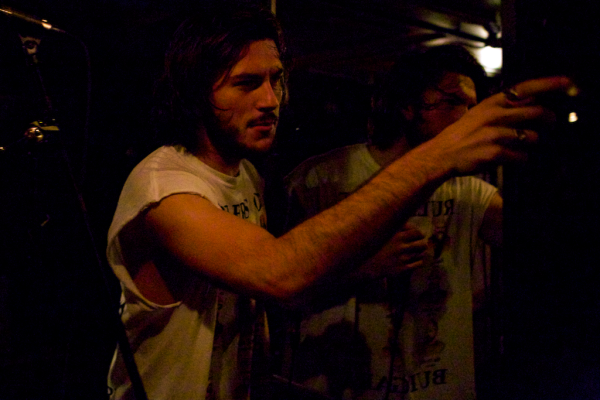Few souls on earth can deliver guitar and vocals in the special and dynamic way that Marcus King does. Knowing how his music has already swept the country, we were excited to meet up with him in NYC for an in-depth interview – especially ahead of the release of El Dorado, his debut studio album. We began by discussing his family’s rich music history. “Fourth generation,” King said of himself. “It could go back even further. My great-grandfather was a farmer; a sharecropper in North Carolina regions, like the Foothills, and my grandfather grew up there. He was one of, I think, ten children. And most of them sang or played music. It was all old-time gospel stuff, and that was kind of how they would escape from everything, you know? ‘Cause they grew up in the prohibition era. My grandfather was born in ‘28, so they were on a lot of hard times in the Great Depression era, and singing and making music is what would make them happy. My grandfather entered a competition to go to Nashville and be one of the A Team musicians – and he plowed the field wrong, and then his uncle beat him with some horse reins. So he said, ‘I’ve had enough of that,’ and he enlisted in the service at seventeen and went overseas in World War II. He won that competition and he never quite made it to Nashville, so in a way, I feel I’m fulfilling some kind of a destiny that he had. And my father is a musician, and has been his entire adult life; a road dog,” he said proudly.
In his ever-appreciative and contemplative tone, King told us about the kinds of music he enjoyed in his youth. “It was beautiful because I had such a large variety to choose from. There were a lot of things available to me there; a lot of blues music that my dad turned me on to. So B.B. King was a staple in the house. Robert Johnson was a big one. Howlin’ Wolf, Muddy Waters, Buddy Guy. Obviously, I listened to a lot of Clapton and Cream and Blind Faith, and I listened to a lot of Traffic. I got into Robin Trower. And with my grandpa, I’d listen to George Jones, Merle Haggard, Hank Williams, Charley Pride, Waylon Jennings – stuff like that. And I tried to source things out on my own. The first time I heard James Brown was unreal.” Analyzing his own genre-surfing style, King explained, “When I’m playing, I just like to give everything that I have, and that’s just kind of how it comes out; in kind of a multicolored suit – which I always thought was a bad thing, but I’ve been learning to embrace it. Anytime somebody would ask us what type of music we play, like when we’re flying out of the airport in Greenville, they’d say, ‘Well, what kind of band are ya?’ and we’d say, ‘Wellllll, how much time do you have?’” he laughed. “It’s a lot of different shit. But now, I’m starting to embrace it, because you can’t really put a tag on me – which is nice, I think.”
Given that his work is influenced by such a variety of styles, we were curious how he might describe his music to someone who has never heard it before. “Well, I would describe it as all these things that I grew up feeling passionate about, style-wise. Gospel music is a big one. Funk music and soul music, which are very close. Rock and roll music. I mean, when I was in high school, I was studying jazz performance, so I was learning a lot of jazz. But then in the evenings, all the jazzers, we’d all go to house shows and see punk rock bands. So I got really into punk rock for a while,” King recalled. He too appreciated how his interest in punk had surfaced while he was doggedly studying jazz. “The juxtaposition with those two art forms really allowed me to see the wild, different extremes that you could go to with your craft, and I really admire punk rock artists. So a little bit of that, and a little bit of jazz, a little country, a little rock and roll, a little Latin infusion there – it’s all over the place.” We went on to discuss King’s impressive energy in the live setting, which has earned him so much attention. “I’ve never been known to really phone one in, ‘cause I’ve seen people do that,” he said openly. “And it looks appealing to be able to save a little bit of yourself, and to go home without having left every part of you on the stage. But for me, it’s just much more therapeutic to leave everything, and to get everything out, you know? And then it builds up again by the next day. I’m able to share again, and it’s just a big release. It’s just a way of letting people inside of my heart a little bit, so I like to perform with every ounce of me.”
Commenting on how he riles up many a crowd, King said, laughing, “Aw man. That took me such a long time. When I first started singing, when I was thirteen, I wouldn’t face the audience. It took me such a long time to become a frontman.” Confirming that he would literally turn around backwards during those early shows, he said, “Yeah, I was so bashful, and really not confident in myself as a singer. And I mean, still – I still feel like there are so many great vocalists out there. But I’ve still got to do the best that I can do, in the most humble way. And commanding an audience is something I learned from playing the bar circuit. ‘Cause people, when they get to a certain point of inebriation, they just kind of need to be told what to do, when they’re in an audience setting. If you have a large group of people, you’ve got to tell them what to do, and if they don’t want to do it, that’s fine. But the option’s there, for sure. And commanding that audience is one of my favorite parts of the job. But it can be unruly sometimes,” he said with a smile.
Floored by the awesome news that Gibson will be releasing a signature guitar in Marcus King’s name, we asked him how that came about. “I was eighteen, and I was actually on my way here for the first time ever, to New York City. And my dad gave me this guitar case, which was Big Red – my grandfather’s 1962 345 – and it was a really special moment. He had passed away four years prior to that. And my father felt really strongly that I needed to have it to kind of have something out there; a little part of home. So I took the guitar with me, and I toured with it for a couple of years. And then I got a newer one, so I could leave it at home, but I always missed it. So Gibson was nice enough to take it – Jim Lillard just took it and just had it with him for two weeks, and learned every part of that guitar, and really studied it, and got very detailed with it, and he made the prototype and just blew me away. So I don’t know when it’s coming out, but I’m really thrilled with the design. I’m so excited to do that for my grandfather.” Our conversation also touched on King’s experience with living legends, and which others he might want to jam with in the future. “We just did the Crossroads [Guitar Festival] with Clapton,” he said happily. “And he and I – we really hit it off. He was a really kind man; extremely gracious. And I’d like to jam with him soon. I’d really like to do something with Neil Young; that’s a big one. There are a lot; I’d be here all day.”
King’s debut solo album, El Dorado (due out January 17th, 2020), was produced by Dan Auerbach of The Black Keys at his Easy Eye Studio in Nashville. According to King, they recorded eighteen tracks together in just three days. Of course, we were eager to learn more about their working relationship and what kinds of traits they share in the studio. “We both really like funky gear, kind of oddball stuff,” shared King. “There was a lot of that on this record. I really admire the way that Dan can see an arrangement in a song, before even one note has been played. He can see what the end result is going to be. There’s a foresight there that I really admire and look up to. And there were things that he does differently that I really wanted to get hip to, you know? That band’s so pro, and so efficient,” he said, speaking about bass player Dave Roe (Johnny Cash), as well as drummer Gene Chrisman and keyboard player Bobby Wood (two of the original members of the Memphis Boys). “So you’ve got the Memphis Boys and others laying it down, so it’s really hard to go wrong. For me, I felt so pressured, just ‘cause I was so intimidated by the band. And Dan was playing on it. It was such a heavy group of cats to be working with, but it all really rolled smooth.” King then listed some things he’d picked up from Auerbach, affirming that “lots of things” he learned from him would influence his music forever. “Some of them would be studio secrets; secrets of the craft. But I guess it’s just kind of reinforced my work ethic. I like to get a lot of things done, and just kind of hit the ground running – and he’s the same way. So it’s always good to have someone in your corner, with a similar kind of outlook on life.”
Very clearly and intriguingly, King then broke down the mechanics of the Nashville Number System that they used in the making of El Dorado. “It’s a number system. So, you’ve got seven notes that you can pull from there, ‘cause once you get to eight, it’s just the octave of one. So, it’s the major scale, which is one, two, three, four, five, six, and seven. A really common one is a one, six, two, five – and you’ve got a one, three, four – and you just kind of write the progression out like that, instead of writing the actual chord. Because then it transposes to any key, so you’ve got an entire chart right there. If I’m singing it and it’s a little low for my range, we can just say, ‘We’re going to take this one upstairs to B-flat.’ And nobody has to change anything. They just transpose to B-flat. And you’ve got that same basic rule of principles with the numbers. I mean, I love it, because that’s about my extent of reading music. I mean, I read music when I was in high school. But it’s not a skill that you can remember or something that you can jump back into…it’s difficult to explain, but it’s not like a craft; it’s more like homework to me. It’s a really incredible craft. For some music, it’s very necessary. But for what I do, I think the number system is just right.” Shedding more light on their studio process, he added, “We’d listen to it and they’d come up with their little ideas that they had done on many records before me, just to give it a little extra vibe. That was pretty cool, to see them deliberating over things, and it was great to be part of that conversation. That was the other cool thing – I was trying to separate myself from being just a guitar player, and just try to just be an artist that they were backing up, which was difficult. It was weird; kind of foreign to me. I liked it.”
For King, El Dorado represents a shift in focus from his guitar work, centering on more of his singing and songwriting. “I was so blessed to work with so many great songwriters on this,” he told us. “So it was great to showcase the songs and have the arrangements back those up, and just let the guitar playing speak for itself – because you don’t really want to shine a light on it, you know? I’m always a fan of the subtleties of life, and to let the guitar playing be the subtle feature on this record is a different approach for me, in some ways. There was one particular evening, we were cutting a song called ‘Break,’ and I was like, ‘So, the guitar solo – it will be right here?’ And Dan’s like, ‘Yeah, the strings will be right here.’ And I was like, ‘So, the strings are gonna be on top of the guitar solo…?’ And he was like, ‘No – hear me out. There’s no guitar solo on this.’ And I was like, ‘Oh shit, I didn’t even think about that,’” King recalled with a grin. “‘Cool. Alright, let’s do it that way.’” He then detailed his remarkable process for gathering song ideas. “Man, they just kind of come and hit me like a wave. It’s a beautiful thing. They just kind of come. I don’t know. It’s like seeing wildlife or something, you know? It’s really difficult when you go out and try to find it. Or when you try to capture it, it can be really inhumane and a little difficult – I’m not a hunter, by the way. But when you let the nature kind of come up to you, it can be really sweet, and more of a beautiful thing, and it’s just a moment. A moment that’s passing or fleeting. And to be able to capture that is even more precious.” Pondering how often these moments come along, he commented, “They come often. The more you’re living, the more you have to write about. But honestly, the less you’re living, you have a lot to write about then, too. ‘Cause you’re pining for those moments that you’re missing. So there’s never a lack of inspiration. That’s what I like about this world.”
Listening to Marcus King’s music, one can really sense how much truth he pours into the lyrics. He discussed whether his songs are autobiographical. “Man, mine are always at least from one part of me. At least from one perspective of mine. And when I’m writing with other people, the part that I bring to the song is always personal. It’s always the way that I see this, or something that I’ve been through. I try to use that perspective always.” King then shared some advice for fellow musicians starting out young. “It’s all about just kind of putting yourself out there and going for it. I started sneaking into clubs and playing when I was thirteen and fourteen, and it worked out. But it’s difficult to give that advice to people, you know? ‘Cause I had someone come up with their daughter who’s a singer, and she’s thirteen. And I was like, ‘Well, when I was her age, I was sneaking into bars. I probably wouldn’t have you give that advice to your daughter.’ But it’s difficult because you don’t want to go that route of like America’s Got Talent, or whatever it is, because that way, it can really sour you on the music industry too early. If you’re gonna get said ‘no’ to, it should at least be by someone who you look up to. For me, it’s just knocking on every door until they finally open up. Just hear what they have to say, and just keep rolling. That was my biggest thing about me, was persistence. That’s helped me out, anyway.”
“It’s really funny to think about it,” King said on the topic of how he often seems like an old soul. “‘Cause from one perspective, it’s like, I am a kid. But on another side of the coin… I would never make myself comparable to like Duane Allman, or Otis Redding, ever, because I just really don’t feel like I hold a candle to that; just me personally, as a musician – they’re my idols. But Duane Allman was twenty-four when he passed away. And you’ve got seventy-year-old men that still look up to him. And he’s a kid in their eyes, or in your eyes, you know? ‘Cause he’s a year older than I am right now. So, at the height of his creative genius, Duane Allman was twenty-four years old when he passed away. So, I don’t know, at some point, things shifted. Because I guess, long ago – I’ve talked to a lot of people about this – it was like, if you hadn’t done anything by the time you were twenty-five, you were washed up. And it’s great now, because I have friends in the business who are pushing forty and just hitting their stride, and finding their musical voice. So there’s no age on it, I think people are starting to realize. There’s no real age limit – I mean, obviously, in some bars,” he said, smiling. “There’s no age on it, man. When I go onstage, I tap into a completely different persona. It’s because I have to. It allows me to keep my sanity off the stage, and allows me to open up – when I’m really generally quite quiet.”
From conversations as insightful as this one, it can be tough to choose favorite moments, but he gave us an unforgettable one at the very end of our talk. In his warm and caring voice, King said, “I always like to send messages to my fans. They’re so good to me, and they make me feel so loved, and I just hope that I can give them that, in return. And sometimes, it all gets to be too much sometimes, and it can be really tough for me to open myself up to so many people. And sometimes, I have to hide away, and I always feel guilty about it. And I just want to go out and say ‘Hey’ to everybody. Sometimes, I’m not mentally there enough to do it, or capable of doing so, but, you know, I do love everybody, and I look forward to meeting you all someday.”
Article: Olivia Isenhart
Photos: Shayne Hanley

